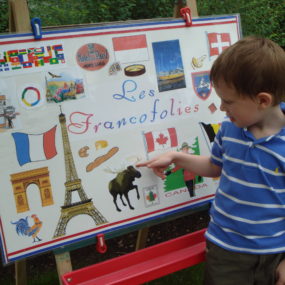The Benefits of Bilingual Education
A foreign language is one of the best gifts you can give your child!
Young children are natural language learners. While adults may struggle with language acquisition, children have the innate ability to learn several languages seamlessly and simultaneously. Not only can children process a new language effortlessly, they also inherently acquire native pronunciation.
Studies have shown there are many additional benefits to the exposure of a second language in early childhood beyond the acquisition of the language itself. Bilingual children have demonstrated increased problem solving abilities, better working memory and improved capacity for abstract thinking, among other benefits. Having the opportunity to experience a foreign language environment also expands children’s multi-cultural awareness, stimulates their curiosity about other parts of the world and fosters an appreciation for understanding multiple points of view.
A majority of students at the Teddy Bear Club have not had any previous French language exposure, although some children arrive fluent in French or other foreign languages. The Teddy Bear Club’s program is not an immersion experience; rather, French is seamlessly blended into activities throughout the day. This approach enables the children to acquire the language in a natural manner.
Many scientists, academics and educators have studied the benefits of exposing children to multi-lingual environments early in life. The following articles offer a sample of current research on the subject.

The Bilingual Advantage by Erica Westly
“Being raised bilingual may actually facilitate the development of certain language and cognitive skills. These aptitudes include mental flexibility, abstract thinking and working memory, a type of short-term memory essential for learning and problem solving.”
(Click to Download PDF file)

Unraveling Children’s Aptitude for Languages by Lauran Neergaard
“The best time to learn a foreign language: Between birth and age 7.”
(Click to Download PDF file)

The Bilingual Advantage by Claudia Dreifus
“People e-mail me and say, ‘I’m getting married to someone from another culture, what should we do with the children?’ I always say, ‘You’re sitting on a potential gift.’
There are two major reasons people should pass their heritage language onto children. First, it connects children to their ancestors. The second is my research: Bilingualism is good for you. It makes brains stronger. It is brain exercise.”
–Dr. Ellen Bialystock, York University in Toronto
(Click to Download PDF file)

